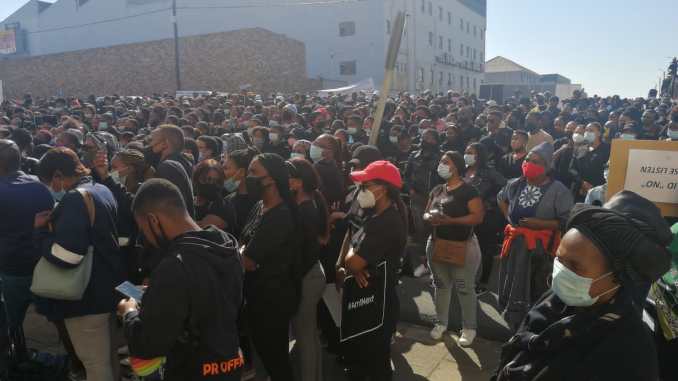
The costs of getting a university education comes at higher cost for female students from poor backgrounds, no less if they are on NSFAS bursaries.
Drugs, alcohol, cohabitation and dating with the sole purpose of having a place to stay are some dark places students in higher education institutions find themselves in due to financial pressure. This is according to several students at tertiary institutions in East London who spoke to Elitsha. The gruesome murder of a university student by her boyfriend has brought into the spotlight the price that women, especially from poor backgrounds, pay to get an education.
On August 17, a 23-year-old final LLB student at the University Fort Hare (UFH) was brutally murdered by her boyfriend. Nosicelo Mtebeni from Matatiele was found murdered, her body dismembered and shoved into a suitcase which was left not far from where she lived with her boyfriend, Alutha Pasile. It was said that the use of drugs and alcohol could have contributed to the commission of this gruesome killing.
He has pleaded guilty to the charge of murder.
Claims that the National Student Financial Aid Scheme (NSFAS) had failed to disburse allowances for private (off-campus) accommodation started circulating on social media, the implication being that Mtebeni had been forced to cohabit with her boyfriend. UFH has denied that Mtebeni was still owed her NSFAS allowance.
In an interview with Elitsha, three UFH students who asked that their names not be published, said that the university last paid their allowance for private accommodation in March. This, according to the students, has forced students to find other ways of paying for their accommodation while some decided to leave the university.
The students said it is common for young girls to find themselves living with a boyfriend just to have a roof over their heads. Sibabalwe (not her real name) is a 25-year-old UFH student from KwaBhaca, a second born with three other siblings. Her elder sister is working as a domestic worker and her unemployed mother lives with her two young siblings, aged six and ten years. She is doing her final year at the university’s East London campus. We met Sibabalwe with two of her friends who told our reporter about their fears after learning of Mtebeni’s death.
“NSFAS failing to pay our allowance in time is one problem but some of us are from disadvantaged families meaning the same little allowance we get we have to share with our siblings. Peer pressure is another thing which led us into dark places of alcohol and drugs,” she said.
“My mother is married to the father of my younger siblings. Me and my elder sister we were raised by our grandmother. She is a pensioner. My sister dropped out of school to find work so she can assist at home. She has two of her children who are depending on her but they are still in primary school,” she said.
Sibabalwe said the university last paid out funds for private accommodation in March. “I was kicked out of my accommodation; as friends we decided to find one place to live together. Because we all don’t have money and there’s no employment, here we had to find ways,” said Sibabalwe.
She told our reporter that she is dating an older man for money. “I hope you are not going to judge but a girl has to do what a girl has to do. My boyfriend is in his 50s and he is working in a right place. I cannot say that I love him or not. Yes he makes me happy but to be honest, if I did not need his money I was not going to date him,” said Sibabalwe. In the past few weeks she has been living with the boyfriend. “I left after I heard about Mtebeni’s death. At least I was lucky that he understands that we are now living in fear and is still continuing to assist me financially,” she said.
Her friend, a 22-year-old second-year student, said she nurses her frustration of not having money by taking drugs. “I don’t crave for drugs but once I start thinking too much I take them to ease my mind and they are helping me,” she said. Her parents used to pay her accommodation costs of R3,500 a month but they cannot afford it anymore.
“I think what frustrates me most is knowing that the money my mother gives is from a loan shark meaning she will have to use my siblings’ [allowances] and my dad’s small salary to repay it and borrow again. For the past three months I decided to stop asking my parents for money because I know they don’t have it. Every time when they call I tell them I’m doing ok but as soon as I drop the call I will burst into tears and that will drive me straight to drugs,” she said.
The girl said she started by smoking weed but is now using tik (crystal methamphetamine).
On Monday 30 August, Minister of Women, Youth and Person with Disabilities Maite Nkoana-Mashabane, visited the Mtebeni family.
On the weekend, she also received a petition from the Uyinene Mrwetyana Foundation at the parliament building. The foundation is calling for the fast-tracking of a National Gender-Based Council. The office of Nkoana-Mashabane issued a statement acknowledging that several studies indicate that a woman is murdered every three hours in SA. Other studies put South African’s femicide rate at almost five times the global average. In 2016, the World Health Organisation ranked the country fourth out of 183 countries for the highest rate of interpersonal violence resulting in death.




 en
en